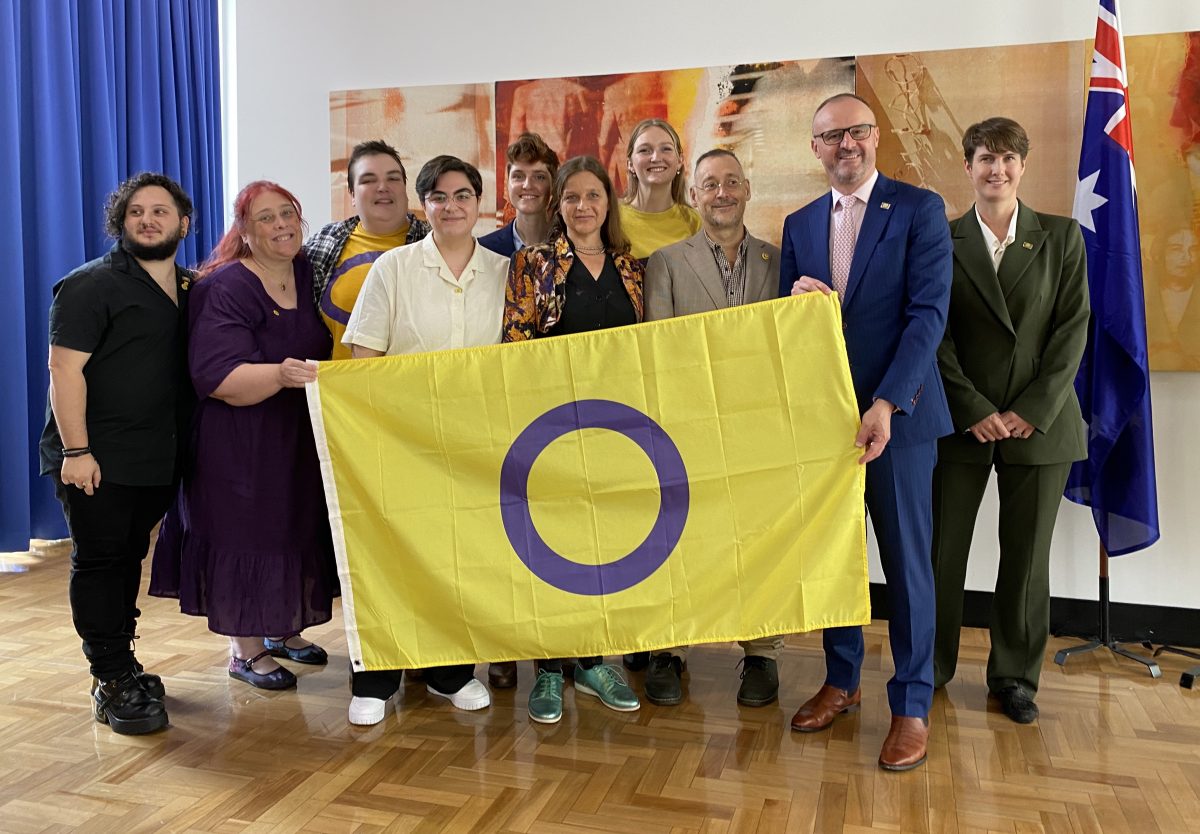
Intersex representatives and allies were overjoyed when the bill was tabled in the Legislative Assembly. Photo: Claire Fenwicke.
Tears flowed on the Assembly floor and outside as an Australian-first bill was introduced in the ACT.
The Variation in Sex Characteristics (Restricted Medical Treatment) Bill 2023 was tabled on Wednesday (22 March), which has been designed to stop “inappropriate medical interventions” on intersex people.
Intersex Human Rights Australia executive director Morgan Carpenter said it was a momentous step to granting intersex people the right to only have body-altering surgery performed when they gave expressed consent.
“These reforms promise to ensure that medical interventions on many people with innate variations of sex characteristics meet human rights norms,” he said.
“They will enable individuals, to the maximum extent possible, people are able to make their own informed decisions about their bodies, about who they are, how they want to live in the world, how they want their bodies to look and function.”
He said it was important to protect intersex people against unnecessary “enhancement” surgeries, or those designed to “feminise” or “masculinise” a person’s gender before they could decide which gender they identified as.
“These are irreversible medical interventions that then cause problems with sexual function and sensation [later on],” Mr Carpenter said.
“They may or may not align with people’s own preferences about how they want to be treated or how they want their bodies to look or function.”
Mr Carpenter stressed this legislation would only apply to unnecessary medical interventions.
“We’ve been very clear from the get-go that we’re trying to end particular harmful medical interventions that occur on infants, children and adolescents to make their bodies fit ideas about how boys and girls, women and men, should appear or function,” he said.
“The intent of the legislation is to protect people’s rights in medical settings, to make sure that medical treatments that are not strictly medically necessary wait until people can consent.
“I hope that people can appreciate that those are fairly standard universal rights and norms that people tend to take for granted.”
Chief Minister Andrew Barr became emotional as he introduced the bill to the Assembly. He said he was proud that the ACT could take this nation-leading step to make these reforms for intersex people a reality.
“This has been a longer journey than it should have been, but journeys have to start somewhere,” he said.
“This has been complex law reform. A number of people who have worked on it have identified it as among the most complex pieces of legislation they’ve ever been involved in, but that goes to underscore the importance of why we needed to do this.
“We now have a piece of legislation that serves as a template for national reform.”
The proposed bill would protect the human rights of intersex people in medical settings and make it so irreversible and non-urgent procedures would have to be deferred until the person is old enough to decide for themselves what should happen to their body.
Once passed, it would be subject to a two-year review.
Canberran Mimi Hall said she was very proud of the intersex community which had worked so hard to bring medical interventions for intersex people to the ACT’s attention.
The 26-year-old discovered she was an intersex person five years ago, having received surgery when she was first born and put on hormone replacement therapy when she was 12.
Ms Hall said this bill was a huge recognition of the community and that something needed to change, both in medical settings and providing psychosocial support.
However, policy was just the first step.
“There’s so much work that has to be done from our society and from our community, and I think it opens the door for conversations and further peer support and connections,” Ms Hall said.
“Hopefully, other intersex people will feel more supported and won’t feel they have to consent to surgery they don’t want.
“I hear so many stories in the intersex community of our bodily autonomy not being upheld and consent not being upheld, and the trauma, the physical and mental scars that that creates is huge within the community, and so to know that there is support and this consent will be upheld within our community in the ACT is huge. It’s just amazing.”
The ACT Government has also invested $2.6 million over four years for new services and supports for intersex people and their families, including the establishment of the Variation in Sex Characteristics Psychosocial Support Unit at the Canberra Hospital and training packages for health professionals.
Intersex Human Rights deputy executive director Bonnie Hart said this was a “new era” for wraparound healthcare for intersex people and those born with variations to their sexual characteristics.
“It can’t be underestimated how difficult some of the decisions [of intersex people and their families] are, and how much stigma there has been directed towards people whose bodies don’t fit neat categories of male and female,” she said.
“By providing support, including peer support, and access to that, funding that, this provides people with so many more options and ways of being in the world, and more resources to be able to live well in the bodies that they have, and live well with the decisions they have made about those bodies when they’re ready to make those decisions.”
It’s hoped this legislation will provide a framework for other jurisdictions to create their laws to protect the medical consent rights of intersex people across the country.













